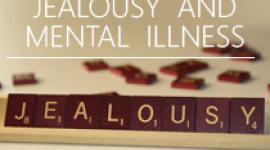Are You Your Psychological Disorder? HealthyPlace Newsletter
Here's what's happening on the HealthyPlace site this week:
- Are You Your Psychological Disorder?
- Contributing to the Stigma of Mental Illness
- Share Your Mental Health Experiences
- "Sex After Sexual Abuse" On HealthyPlace TV
- From HealthyPlace Mental Health Blogs
- Parenting a Hypersensitive Teen
Are You Your Psychological Disorder?
I'm reading Bipolar Vida blogger, Cristina Fender's recent post, "I'm Not Just My Bipolar Disorder," when it strikes me how many times I've read or heard people with mental health conditions refer to themselves by the specific psychological disorder they have. For instance, "I'm bipolar" or "I'm schizophrenic;" like their mental health symptoms define their personality and character. Compare this to people suffering from medical conditions. Have you ever heard anyone ever say "I'm cancer" or "I'm migraine headache?"
Contributing to the Stigma of Mental Illness
As you might imagine, thinking of yourself as your mental health diagnosis, mostly carries with it a negative connotation. You begin to equate the negative aspects of your condition with who you are. The negative self-talk begins and destroys your self-esteem. But another thing happens. By identifying yourself by the symptoms of the psychological disorder, other people no longer look at the mental health condition as being similar to a "medical issue" - that isn't your fault and can be treated. Instead, in some people's minds, bipolar disorder equals "crazy" or "dangerous." ADHD becomes synonymous with scattered brained and lazy. And that contributes to the stigma surrounding mental illness.
Instead, wouldn't it be healthier all around to say "I have a condition called ... ?
Share Your Mental Health Experiences
Share your thoughts on "stigma of mental illness" or any mental health subject, or respond to other people's audio posts, by calling our toll-free number (1-888-883-8045).
You can listen to what other people are saying by clicking on the gray title bars inside the widgets located on the "Sharing Your Mental Health Experiences" homepage, the HealthyPlace homepage, and the HealthyPlace Support Network homepage.
If you have any questions, write us at: info AT healthyplace.com
"Sex After Sexual Abuse" On HealthyPlace TV
Having sex after being a victim of incest, rape, or other form of sexual abuse can be challenging and raise many difficult issues. Sex therapist, Wendy Maltz, LCSW, DST, tackles the subject on this week's HealthyPlace Mental Health TV Show.
continue story below
Watch the interview on the HealthyPlace Mental Health TV Show website. On-demand after next Tuesday.
- Sexual Repercussions From Sexual Abuse (tv show blog, guest post.)
Coming in May on the HealthyPlace Mental Health TV Show
- Meeting Life's Challenges with Strength
- PTSD: Dealing with Trauma in Your Life
- Alternative Therapy for Mood Disorders
If you would like to be a guest on the show or share your personal story in writing or via video, please write us at: producer AT healthyplace.com
Click here for a list of previous HealthyPlace Mental Health TV Shows.
From HealthyPlace Mental Health Blogs
- Trading Creativity for Bipolar Medication (Bipolar Vida blog)
- Adult ADHD: Cover That Mouth Before You Use It! (ADDaboy! adult ADHD blog)
- Obesity Prevention and Eating Disorder Prevention (Eating Disorder Recovery: The Power of Parents blog)
- Anxiety Tool: Track Anxiety Levels With Your Menstruation Cycle (Nitty Gritty of Anxiety blog)
- Do You Have Anxiety While Driving?
- Keeping a Watchful Eye on ADHD-fueled Projects
- I'm Not Just My Bipolar Disorder
Feel free to share your thoughts and comments at the bottom of any blog post. And visit the mental health blogs homepage for the latest posts.
Parenting a Hypersensitive Teen
Does your teen take everything too personally? Is it to the point where everything you say is misinterpreted and now you're walking on eggshells. Dr. Steven Richfield, our parenting expert, has advice for parents of a hypersensitive teen.
APA Reference
Staff, H.
(2010, April 28). Are You Your Psychological Disorder? HealthyPlace Newsletter, HealthyPlace. Retrieved
on 2025, December 8 from https://www.healthyplace.com/other-info/mental-health-newsletter/sex-after-sexual-abuse


